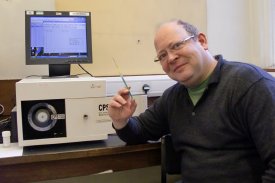May 28 2010
The Centre for Nanoscale Science at the University of Liverpool has selected the DC24000 from CPS Instruments Europe to support their work in nano particle characterisation in biomedical applications.
Multidisciplinary research projects led by Professor Mathias Brust, of the Department of Chemistry, involve the chemical modification of (6-80 nm) metal nano particles with biologically active molecules such as anti-cancer drugs, enzymes or signal peptides. The technology behind the DC24000, differential centrifugal sedimentation (DCS), allows the group to investigate particle size distributions and monitor the modification step which requires precise control over the type and number of ligands attached to the particles.
 Professor Mathias Brust prepares a sample for the CPS DC24000.
Professor Mathias Brust prepares a sample for the CPS DC24000.
A whole range of particle sizing, spectroscopic and electrochemical techniques are available at the Centre including DLS, TEM, SEM, FTIR, NMR and SERS; the DC24000 was purchased as it deals particularly well with multi-modal size distributions.
Referring to the CPS DC24000, Professor Brust comments;
'It is fantastic for monitoring minute thickness changes, for example those caused by chemical reactions in the ligand shell of nano particles. Although at present it is still qualitative, it is nevertheless very powerful and extremely fast and easy to do with very small amounts of material. In our hands it compares very favourably with most spectroscopic techniques'.
The CPS DC24000 delivers routine ultra high resolution analysis of nano particle populations down to 2 nm and differing in size by as little as 2%. The instrument has revolutionised nano particle size characterisation, proving to be an invaluable tool for countless nano applications around the World.
Further work for the group involves the investigation of quantitative measurements of molecular ligand shell thickness in monolayer protected clusters with a thickness resolution of a single C-C bond.
For more information on the DC24000 from CPS Instruments Europe please visit: www.analytik.co.uk (UK and Ireland) or www.cpsinstruments.eu